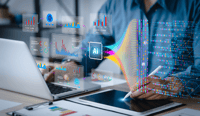GenAI has found its way into our work and home lives, making tasks more manageable and interactions more engaging. But to what extent is it a passing trend in broader technological development? And how might GenAI affect our lives in the future?
From generating personalised content for social media, to helping with language translation, people are increasingly relying on AI-driven tools to enhance their personal lives.
In a professional setting, GenAI is being used in specialised tasks ranging from marketing campaigns and coding, streamlining workflows, coaching sales teams and boosting productivity. Innovative new tools such as Open AI’s ChatGPT, which handles text, data, images, and soon video (with the imminent launch of Sora), exemplify how GenAI capabilities are expanding at pace. Some companies are spending millions of dollars on custom Large Language Models (LLMs) to generate competitive advantage in the marketplace. Yet there is a surplus of products/new features labelling themselves as ‘AI powered’ or ‘AI copilots’ which seem to be more akin to an iteration on the technological advancements that have been evolving since the industrial revolution.
The monetisation of AI solutions is still being tested out, and organisations are now gathering evidence of their tangible value. The question businesses need to ask themselves is whether the value from an AI tool is greater than having a human agent carrying out the task or role?
GenAI-led daily routines
GenAI seems to be infiltrating ever more of our lives…if we want it to. Want to know what’s going on in the world as you wake up? Request a personalised news briefing. Looking to optimise your morning workout? Here’s a virtual personal trainer with a personalised routine, powered by GenAI. Such functionality is becoming increasingly normalised and expected; in the same way mobile phones now come with navigation, photography and other technological developments as standard fare.
Whether you invite GenAI-powered products to prioritise your emails, compose draft responses, or plan for an upcoming meeting using GenAI-summarised notes outlining previous discussions and research - all these productivity gains can shave hours of administrative tasks off a working week.
After work, eat the food ordered on Amazon Fresh based on your preferences and what was running low in the fridge; before improving your conversational Italian with a personalised lesson ahead of your summer holiday. Before bed, get started on a book that’s AI-recommended, and finally, journal your thoughts and reflections to enhance your self-awareness and track your personal growth – with the help of GenAI.
By integrating GenAI into these daily routines, we can streamline tasks, enhance productivity, and make more informed decisions, ultimately leading to a more efficient and balanced lifestyle.
So, what’s here to stay and what’s going to hit the buffers?
GenAI: Here today, gone tomorrow
The market is flooded with GenAI tools and rapid proliferation often leads to scepticism about the sustainability of all these options.
Products without clear use cases such as AI-powered gadgets can fail to deliver tangible benefits. For example, smart toasters and AI-driven pet feeders might struggle to find a lasting market due to their limited impact on everyday life. AI chatbots that operate without human oversight or intervention may struggle due to their inability to handle complex, nuanced interactions or their negative impact on the customer experience. As users demand higher-quality customer service, these autonomous chatbots are likely to lose favour and the business case may simply not stack up, due to the exorbitant licensing costs.
Major tech companies are consolidating their GenAI offerings, adding more capabilities to their flagship products. For example, ChatGPT’s evolution from text-based interaction to handling multiple formats suggests a trend towards fewer, more powerful tools dominating the market. Others are offering as a premium product to their core offering, such as Microsoft’s Copilot.
GenAI: The future
As people grow accustomed to GenAI, they may incorporate multiple AI-driven applications into their daily routines in the future, a concept known as ‘habit stacking’. Other people will rely on one or two key tools that significantly enhance productivity in their workplace.
GenAI’s potential to automate administrative tasks suggests a future where jobs and organisational structures are fundamentally redesigned. By offloading routine tasks to AI, employees can focus on more strategic, creative, and interpersonal aspects of their roles, leading to more efficient and fulfilling work environments.
Just as the digital revolution created roles like social media manager and data scientist, GenAI will necessitate new positions focused on managing, developing, and maintaining AI systems, as well as leveraging AI to drive business growth.
Ethical considerations
The ethics of AI are complex. AI systems often reflect the biases present in their training data, leading to discriminatory outcomes in areas like hiring, law enforcement, and lending. Privacy is at risk as AI-driven technologies collect and analyse vast amounts of personal data. Job automation threatens to replace human workers, raising concerns about unemployment and economic inequality. AI's environmental impact is also growing, with energy-intensive computations contributing to carbon emissions and e-waste, while other ethical considerations include the potential misuse of AI in surveillance, warfare, and deepfakes. The future of AI depends on robust regulation and oversight.
Conclusion
There’s no doubt that GenAI is reshaping how we work, live, and interact, bringing both opportunities and challenges. While some AI-driven tools are likely to be passing fads, others are proving essential, offering tangible value in professional and personal settings. As the technology matures, its impact will deepen, transforming job roles, enhancing productivity, and redefining daily routines. However, ethical concerns around bias, privacy, job displacement, and environmental impact must be carefully managed. The future of GenAI hinges on balancing innovation with responsible use, ensuring that it serves society’s best interests. Ultimately, how we adapt to and regulate GenAI will determine its lasting influence on our lives.
To discuss how GenAI could shape the future of your business, contact us.







